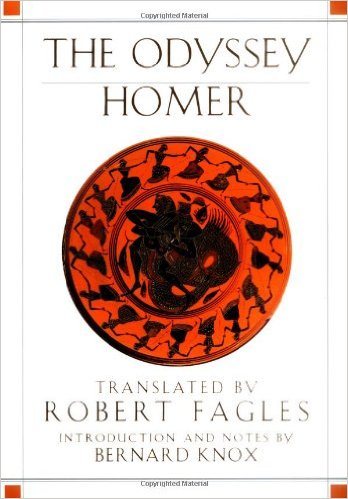I’m much more familiar with Iliad than The Odyssey. As a teenager, with the help of a magnifying glass and Liddell and Scott’s ancient Greek lexicon, I learnt to write the first line of Iliad in Greek from memory, a silly party trick.

Robert Fagles’ verse translation of Odyssey succeeds at turning the poem into fathomable vernacular, though there are times when one feels he must have strayed reasonably far from the nuances of the original Greek. On balance I probably prefer the prose translation of E. V. Rieu, revised by D. C. H. Rieu, philistine though that might appear. I intend to read George Chapman’s Homer sometime soon. Fagles‘ Odyssey has been a fine companion though and despite knowing the story am still not immune to the heightening tension as it progresses toward the slaughter of the suitors.

This summer I plan a second attempt at Robert Musil’s The Man Without Qualities, joining Richard and Francis for the 1130 pages—or 1770 with From the Posthumous Papers edition—translated by Sophie Wilkins and Burton Pike. I am hoping this more modern translation keeps my interest longer than that of Eithne Wilkins and Ernst Kaiser.
As a side project I’m slowly collecting and reading a series of little books on modern European literary figures, published in the fifties by Bowes and Bowes of Cambridge. The first four I have are on Sartre, Kleist, Jacques Riviere and Valery. They caught my eye when watching the video of Duncan Fallowell’s library. They look wonderful and may number fifty or so in number.
Other reading plans, always subjects to whimsy, include dipping into Anita Brookner’s oeuvre, exploring whether William Gerhardie’s work still stands up, undoubtedly more Schmidt and Redonnet, and more ancient Greeks.





As ever, your reading menu sounds fascinating. I will watch eagerly with only one eye open lest I be led astray. Actually, a need to redirect my resources for a while will hopefully focus my attention on the books I already own (which just happens to include Schmidt’s novellas – don’t know how that happened).
Oh, I am so easily deflected from intentions that seemed so firm only days, even hours ago.
Interesting – I was always more familiar with The Odyssey than the Iliad. I think the idea of a voyage, of a return home forever thwarted by obstacles and distractions, appealed to me far more than battle scenes. I think I read it in Romanian first, and can’t remember (shock, horror) what English translation I did read.
As for Musil – always a pleasure to reread, although I find a small dose can go a long way.
Time will tell how far I make it through Musil, though am feeling ready for the task.
I’ve considered the Musil in the past but never had the gumption to start it – will be interested in your thoughts!
Starting the Musil is the easy part …
I enjoyed the Fagles but still prefer Lattimore; I’m more familiar with the Iliad, too, and read it (gulp) in Greek — one of the major thrills of my young college years, long ago. The Odyssey is an entirely different book, I think, with a different thrust; Fagles’ version is definitely filled with life but somehow his language doesn’t move me.
Guy Davenport’s enthusiasm for George Chapman’s Homer encourages me to make that my next translation, but I’ll get to Lattimore one day. I’m working on my Greek but I’m a long way from being able to read Iliad.
I also intend to read more Ovid if I can source a decent translation of The Heroides.
I’ve only read Metamorphoses but that’s left me with an appetite for more Ovid, look forward to reading both.
I’m much more familiar with the Illiad myself. I grew up on the prose translation (well, read it as a teenager to be more accurate), but read the Lattimore a year or so ago and was very impressed by it. Sadly it fell into a period where the blog got a bit much and I had to skip some reviews, including that, but it was exceptional.
My next Homer-related project is to engage with some of the secondary works it inspired: War Music and Oswald’s tribute to Homer.
I’ll read War Music this year too, and like Oswald’s Homer. I also want to read Chapman’s Iliad and perhaps next year his Odyssey.